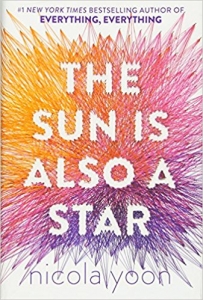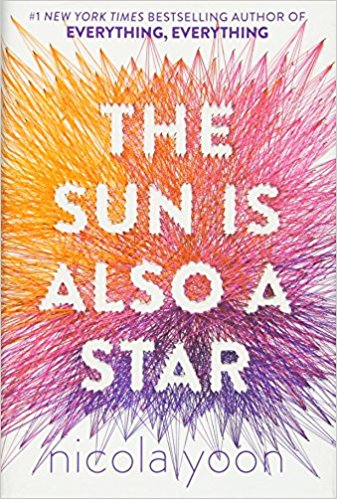
Natasha and her family will be deported by the end of the day, unless Natasha succeeds in her final efforts to delay their return to Jamaica. On the same day, Daniel reluctantly makes his way to his interview with a Yale alumn to satisfy his Korean parents. In a serendipitous twist of fate, their paths cross, and in Daniel’s desire to live one day on his own terms instead of his parents’, he convinces Natasha to participate in a science experiment, hypothesis: When two people share their answers to a certain set of questions with one another, they will fall in love.
The novel takes place over the course of a single day, and is narrated by Natasha, Daniel, and the universe, which shares the perspectives of those that the untimely duo come into contact with throughout their day together—people whose lives shift in unpredictable ways after crossing paths with the protagonists. It’s a simultaneously uplifting and heartbreaking story about love and fate, and also about racism and identity.
What about this book made it a Finalist for the 2016 National Book Award, 2017 Coretta Scott King New Talent Award Winner, and one of the top ten best books of 2016 according to Publisher’s Weekly, Kirkus Reviews, Entertainment Weekly, and a variety of other publications? Its inspiring characters and innovative form.
The protagonists are dynamic, smart, and incredible role models of diverse identities. Natasha is a strong Jamaican teenager interested in math and science. Daniel is a sensitive Korean-American with dreams of writing poetry for a living. And these characteristics are not just on the surface-level. They’re essential aspects of the characters’ values that inform their decisions, making their identities crucial aspects of the plot and their developing relationship.
The form develops the theme of how one’s actions cause a ripple effect that alters the paths of even those who are many degrees removed from the individual. The alternating perspectives also allow internal access into both protagonists and a variety of characters that would otherwise appear as inconsequential to the plot. Doing so allows the reader to interpret many of the scenes with a variety of perceptions.
The form would’ve been even more effective if the chapters narrated by the universe were always in the same point of view. Even some that are from the perspective of the same character—such as all the chapters from the POV of Daniel’s Dad—alternate between first and third person. Being consistent would better develop the secondary characters whose voices are heard in such chapters, although I was still in love with the novel without this consistency.
While a film adaptation of The Sun Is Also A Star is in the script writing stages, the film adaptation of Yoon’s first novel, Everything, Everything (which is also told with an effective unconventional form from the perspective of a protagonist of color), will be released on May 19th.
The multifaceted nature of the novel makes it appealing to scientists and poets and everyone in between. YA and romance readers will enjoy the unconventional way Yoon tells the young love story, while the larger theme of fate versus free-will will leave philosophers and dreamers pondering beyond the pages of the novel. If you haven’t started to read it yet, you are truly missing out on a wonderfully written, touching story!

